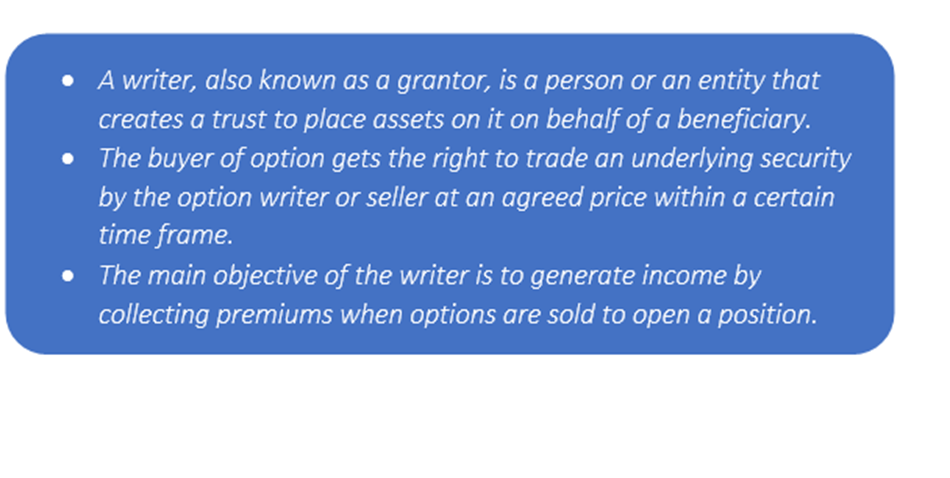Writer
Updated on 2023-08-29T11:56:40.001253Z
Who is a Writer?
A writer, also known as a grantor is a person or an entity that creates a trust to place assets on it on behalf of a beneficiary. It is the seller of both the call and put options that open a position to receive premium payments from the buyer of an underlying asset that are covered or uncovered. Option holders buy options from exchange and are responsible for the payment of the premium to the writer. It is known as trustmaker, settler or trustor.
A covered option is when a shareholder itself sells a call option to collect premium from the option buyer and as the underlying shares are not owned by the writer in such a situation, the underlying shares will be sold at the strike price of the contract. In a covered put option, the shares are owned by the writer not by the shareholder.
An uncovered position is also called naked option and the uncovered option writer may face the risk of huge losses if underlying assets moves against their assumption. In case, if option expires out-of-the-money, the option writer receives the entire premium.

Deeper Definition
The buyer of option gets the right to trade an underlying security by the option writer or seller at an agreed price within a certain time frame for which they receive premium. However, if the option is uncovered the writer has to face huge risk, so they want option buyer not to expire option in-the-money. For example the put option buyer hopes underlying stock to drop below the strike price for huge profit whereas put writer hope it doesn’t.
Uncovered options are the contracts where writer has agreed to buy shares at the strike price, but it does not have any corresponding sell position to offset the risk of buying shares. So you don’t have to own shares writer write calls on or hold short shares that they writes puts on, as you may suffer huge losses from an adverse move in the underlying asset’s price.
The main objective of the writer is to receive premiums when options are sold to open a position and to receive huge profit when it sells expire out-of-the-money options. The option contracts expires out-of-the-money for call writers when the strike price of the contract closes above the underlying share prices and the contract expires out-of-the-money for put writers when the Strike price of the contract closes above the underlying assets price. In both the cases the writer receives entire premium for the sale of the contracts.
The writer earns losses when contract moves in-the-money as they need to buy the option again for a higher price than what they got.
Call Writing
The covered call option usually results in one of three outcomes and if the option expire out-of-the-money the writer receives the entire premium. However, if the option expires in the money the writer have to buyback the option to close the offsetting position or have to let the underlying asset called away at the strike price.
Called away refers to the situation when writers need to sell their shares to buyer at the strike price to closing the option position and the difference between the premiums received and paid to buy the option back is the profit and loss of the writer.
In case, the price of the underlying closes in-the-money, the writer has to buy the shares from the market to provide shares to buyer or to close the position. The loss is the difference between the market and strike price, along with the premium received.
Put Writing
When the position is covered and put writer is short there will be corresponding number of shares sold short and in case of short option closes in-the-money it is used offsets the loss of the written put.
However, in case of uncovered position the writer needs to buy the same option to close the position or buy shares at the strike price. If the writer buys the shares the loss is the difference between the market and strike price, minus premium received, but if the position is closed by buying a put option the loss is the difference between premium paid and premium received.
Premium Time Value
The option writer take time value in consideration, it is the part of an option’s premium that refers to the time remaining until the expiration of the option contract. The longer the expiration period the higher the time value as there will be higher chance that the option may move into-the money. In such a case, option buyer has to pay higher premium for a similar contract with a longer expiry that a shorter expiry. The premium includes extrinsic and intrinsic value.